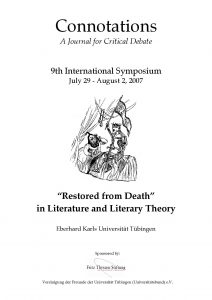Restored From Death

The range of aspects to be included under the heading of “Restored from Death” is a wide one. It combines textual and theoretical, traditional and very current issues. There is, for example, the rather obvious case of a character being “recalled to life” who has been dead for quite some time. The restoration may be a magical, metaphorical, mythical, real … one; Dickens’ Dr Manette and Stevenson’s Captain Flint indicate just two possible ways. The subject may be seen from a rhetorical perspective (as when Quintilian, speaking of fictio personae, says “we are even allowed in this manner of speaking to bring down the gods from heaven and raise the dead”) or a historical and historiographical one (as when Nashe says about Shakespeare’s 1 Henry VI: “How would it have joyed brave Talbot … to think that after he had lain two hundred years in his tomb he should triumph again on the stage, and have his bones new-embalmed with the tears of ten thousand spectators at least.”) We may also consider the imaginary deaths of poets (e.g. in Berryman or Plath) or the fact that the writer brings (back) to life what otherwise would have remained nameless, forgotten or dead; at the same time, this poetical, dramatic or narrative (re-)animation implies the ‘killing’ of what is excluded from the author’s choice. The myth of Orpheus as a model or archetype of a writer’s journey to the realm of death will probably be considered, just as memory will play a special role as a means of poetic resurrection (cf. Shakespeare’s Sonnets).
Articles in this special issue
- Resurrection as Blasphemy in Canto 5 of Edmund Spenser's "The Legend of Holiness"
Åke Bergvall
Connotations Vol. 16: 1-10 - Echo Restored: A Reading of George Herbert's "Heaven"1)
Inge Leimberg
Connotations Vol. 16: 11-25 - The Trials and Tribulations of the revenants: Narrative Techniques and the Fragmented Hero in Mary Shelley and Théophile Gautier
Elena Anastasaki
Connotations Vol. 16: 26-46 - Decadence and Renewal in Dickens's Our Mutual Friend
Leona Toker
Connotations Vol. 16: 47-59 - The Return of the Dead in Margaret Atwood's Surfacing and Alias Grace
Burkhard Niederhoff
Connotations Vol. 16: 60-91 - "For/From Lew": The Ghost Visitations of Lew Welch and the Art of Zen Failure. A Dialogue for Two Voices
John Whalen-Bridge
Connotations Vol. 16: 92-115 - Dis(re)membering History's revenants: Trauma, Writing, and Simulated Orality in Toni Morrison's Beloved
Hannes Bergthaller
Connotations Vol. 16: 116-36 - Donne’s Sermons as Re-enactments of the Word
Margret Fetzer
Connotations Vol. 17: 1-13 - The Intrusion of Old Times: Ghosts and Resurrections in Hardy, Joyce and Beyond
Norbert Lennartz
Connotations Vol. 17: 14-28 - "Stand and live": Tropes of Falling, Rising, Standing in Robert Lowell's Lord Weary's Castle
Frank J. Kearful
Connotations Vol. 17: 29-60 - Painful Restoration: Transformations of Life and Death in Medieval Visions of the Other World
Fritz Kemmler
Connotations Vol. 17: 129-43